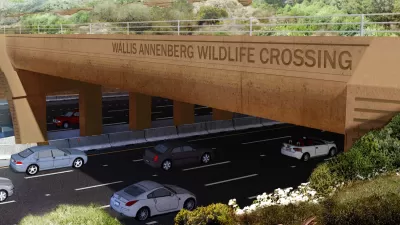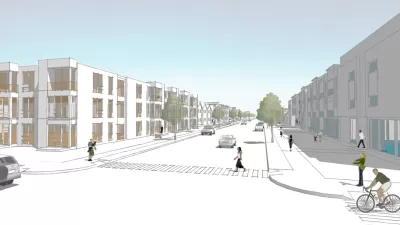Inclusionary zoning and weakened urban growth boundaries are not effective tools for reducing the price of housing. Joe Cortright of City Observatory suggests ending parking requirements instead.
Joe Cortright analyzes the potential consequences of a political trade off regarding a process to reform some of the regulations that impact land use and development in Oregon.
As has already been reported, the Oregon State Legislature is considering a package of bills that could overturn the state's ban on inclusionary zoning. The legislation is proposed as a measure to counter the state's rising affordability problem. In the negotations leading up the inclusionary zoning legislation, the development and building industries is asking for something in return:
As a quid pro quo for agreeing to drop the ban—at least for rental housing—the development industry is suggesting it would like to see the state’s land use laws, including its signature urban growth boundary, weakened.
Cortright's focuses on the consequences of "bursting" Portland's urban growth boundary. In fact, Cortright says that possibility, combined with new inclusionary zoning, would likely make Portland's affordability worse.
To back up his larger claim, Cortright lays out a seven-point argument, each detailed in the article. Here's an abridged version of the list:
- Affordability is about growing up, not out.
- The market demand/affordability problem is in the urban core.
- Adding more supply in the core is the key to addressing affordability.
- Inclusionary zoning increases market prices.
- Inclusionary zoning creates only token numbers of affordable units.
- Inclusionary zoning requirements would encourage further sprawl.
- If we want to make housing more affordable, let’s get rid of parking requirements.
FULL STORY: Bursting Portland’s urban growth boundary won’t make housing more affordable

Pennsylvania Mall Conversion Bill Passes House
If passed, the bill would promote the adaptive reuse of defunct commercial buildings.

World's Largest Wildlife Overpass In the Works in Los Angeles County
Caltrans will soon close half of the 101 Freeway in order to continue construction of the Wallis Annenberg Wildlife Crossing near Agoura Hills in Los Angeles County.

U.S. Supreme Court: California's Impact Fees May Violate Takings Clause
A California property owner took El Dorado County to state court after paying a traffic impact fee he felt was exorbitant. He lost in trial court, appellate court, and the California Supreme Court denied review. Then the U.S. Supreme Court acted.

California Grid Runs on 100% Renewable Energy for Over 9 Hours
The state’s energy grid was entirely powered by clean energy for some portion of the day on 37 out of the last 45 days.

New Forecasting Tool Aims to Reduce Heat-Related Deaths
Two federal agencies launched a new, easy-to-use, color-coded heat warning system that combines meteorological and medical risk factors.

AI Traffic Management Comes to Dallas-Fort Worth
Several Texas cities are using an AI-powered platform called NoTraffic to help manage traffic signals to increase safety and improve traffic flow.
City of Costa Mesa
Licking County
Barrett Planning Group LLC
HUD's Office of Policy Development and Research
Mpact Transit + Community
HUD's Office of Policy Development and Research
Tufts University, Department of Urban and Environmental Policy & Planning
City of Universal City TX
ULI Northwest Arkansas
Urban Design for Planners 1: Software Tools
This six-course series explores essential urban design concepts using open source software and equips planners with the tools they need to participate fully in the urban design process.
Planning for Universal Design
Learn the tools for implementing Universal Design in planning regulations.


























